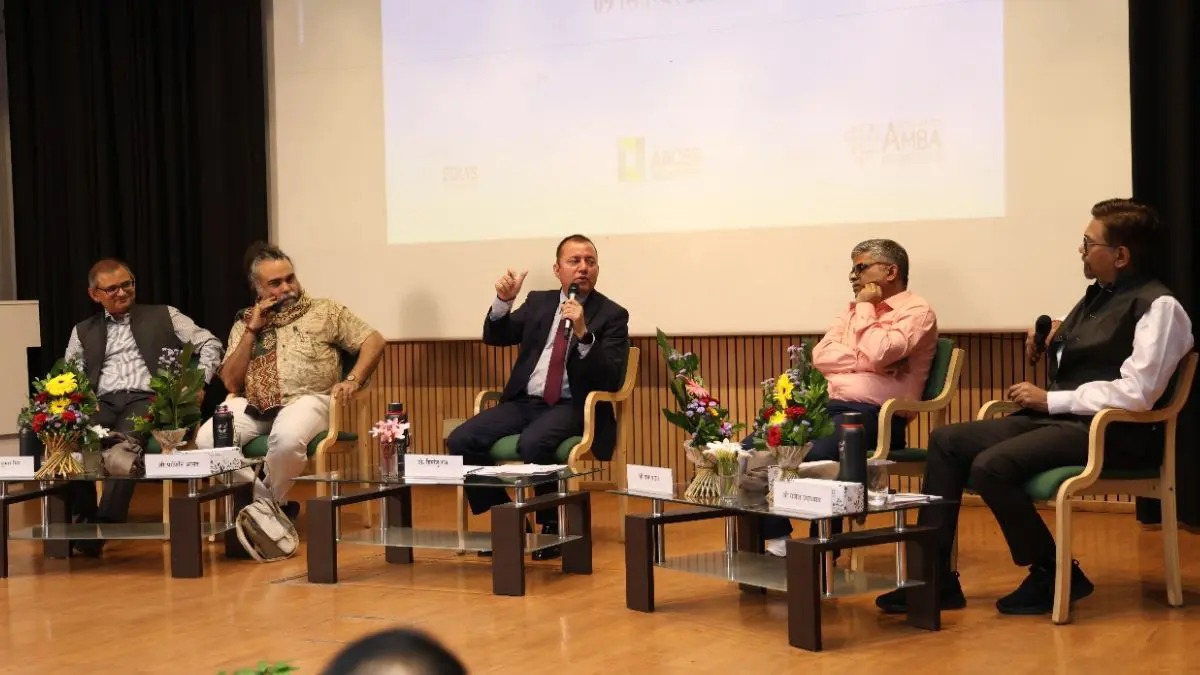Hindi Diwas 2024: Indian Institute of Management Indore (IIM Indore) celebrated Hindi Diwas on September 9, 2024. The event was inaugurated by Prof. Himanshu Rai, Director, IIM Indore. He underlined the importance of Hindi language in the rapidly evolving digital landscape.
Hindi is our rich cultural heritage: Prof.
Prof. Himanshu Opinion Speaking about the important role of languages in shaping the culture and identity of the nation, Rai highlighted the need to understand the deep connection between language, culture and civilization. He said that culture and civilization are nurtured by language. Similarly, Hindi as a language also plays an important role in preserving and promoting our rich cultural heritage. He said that the foundation of our culture lies in our languages and Hindi is one of the major languages that carry forward this cultural heritage. Prof. Rai said that today's youth often have individual ethics but lack collective social ethics. He emphasized the importance of imparting these ethics and values through Hindi to guide the society and preserve our cultural roots. Talking about the uniqueness of Hindi, he said that this language is written the way it is spoken and it has absorbed words and influences from many other languages, making it a rich and adaptable medium. He praised Hindi for its ability to guide, clarify and enlighten people.
Prof Rai stressed the need to guide society, culture and the nation by incorporating the knowledge acquired in Indian languages into our lives. He urged everyone, even those unfamiliar with Hindi, to try to speak and preserve it along with all other Indian languages. Speaking these languages helps connect people and maintain unity, he said, adding that Indian languages are essential to keep the country united. “Respect and care for your language like your mother, as it nurtures and shapes your identity, just like a mother nurtures her child,” he said.
panel discussion
This year's event featured a panel discussion on “Media and the Digital Age of Hindi Journalism”. Network 18 Group Editor – Integration and Convergence Brajesh Kumar Singh, Hindustan Times Digital Indian Language Editor Prabhash Jha, TV9 Digital, TV9 Bharatvarsh Group Editor Panini Anand and Jagran New Media Executive President and Editor-in-Chief Rajesh Upadhyay participated. The session was moderated by Prof. Himanshu Rai. The panelists discussed how Hindi journalism is adapting and evolving in the digital age.
The foundation of strong journalism still lies in literature: Rajesh Upadhyay
Rajesh Upadhyaya focused on the transformative power of digital journalism and called it the future. He described the language as both a science and an art, with writing an art and understanding it a science. Despite the rise of digital platforms, many people still search for information in Hindi and its relevance remains intact. While digital journalism has brought about significant changes in the way content is delivered, argued that the foundation of strong journalism still lies in literature. He also emphasised that profits in Hindi journalism may fluctuate, but the rising literacy rate ensures its continued relevance.
'Hindi also played an important role in shaping the language'
Brajesh Kumar Singh emphasised the role of Hindi writers in the preservation and development of the language. He highlighted that Hindi writers not only gave a new direction to literature but also played an important role in shaping the language. He said that the language of literature is different from the colloquial Hindi shown in films, which has evolved over time. He said, “The increasing use of Hindi in the digital sector will not only impact other Indian languages but will also promote their development.” He said that digital expansion will boost the use of Hindi along with other regional languages as India has reached the threshold of overtaking China in terms of internet users.
'Literature is the motherland of journalism'
Reflecting on the deep historical connection between Hindi journalism and literature, Panini Anand said that “literature is the motherland of journalism.” He added that journalism emerged from the rich tradition of literature and historically Hindi journalism had the essence of literature. However, he added that today’s journalism lacks the literary depth it used to have earlier. He added, “The digital boom, especially during the pandemic, has changed the landscape of language use.” The language of journalism has changed over the years, but the demand for content in different languages will only increase, indicating a more linguistically diverse future.
'Digital media cannot change the essence of language'
Prabhash Jha highlighted the importance of clarity in communication and the need for Hindi journalism to maintain its connection with literature. He said the old era of journalism was heavily influenced by Hindi writers and thinkers. According to him, literature forms the basis of language and communication and it is important that Hindi journalism evolves in a way that it is accessible even to readers unfamiliar with the language. “Language is constantly influenced by cultural changes, including travel and migration, which affect vocabulary and pronunciation,” he said. He further said digital media cannot change the essence of language but affects the way it is heard and adopted.
Hindi Magazine Publications
The panel collectively agreed that the digital age presents challenges but also opportunities to expand the reach of Hindi, making it a vital force in shaping India's future cultural and linguistic landscape.
The annual Hindi magazine “Gyan Shikhar” was also released at the event. It included formations of the IIM Indore community. Prizes were given to the winners of the Antakshari competition organized during the Hindi fortnight.
The successful organization of Hindi Diwas and related activities underlines IIM Indore's dedication to the preservation and promotion of Hindi and our Indian languages while adopting modern advancements.
 look news india
look news india
